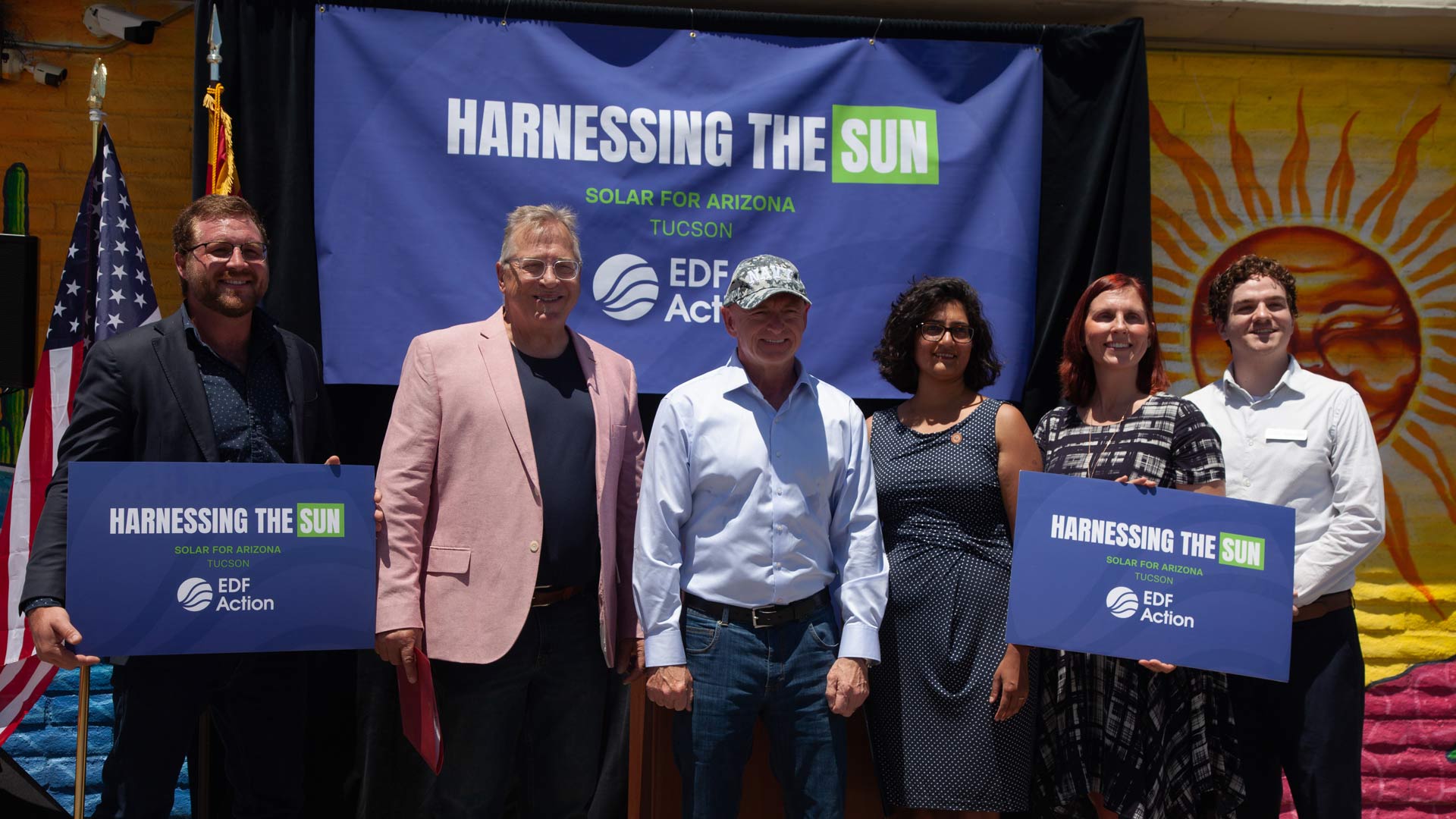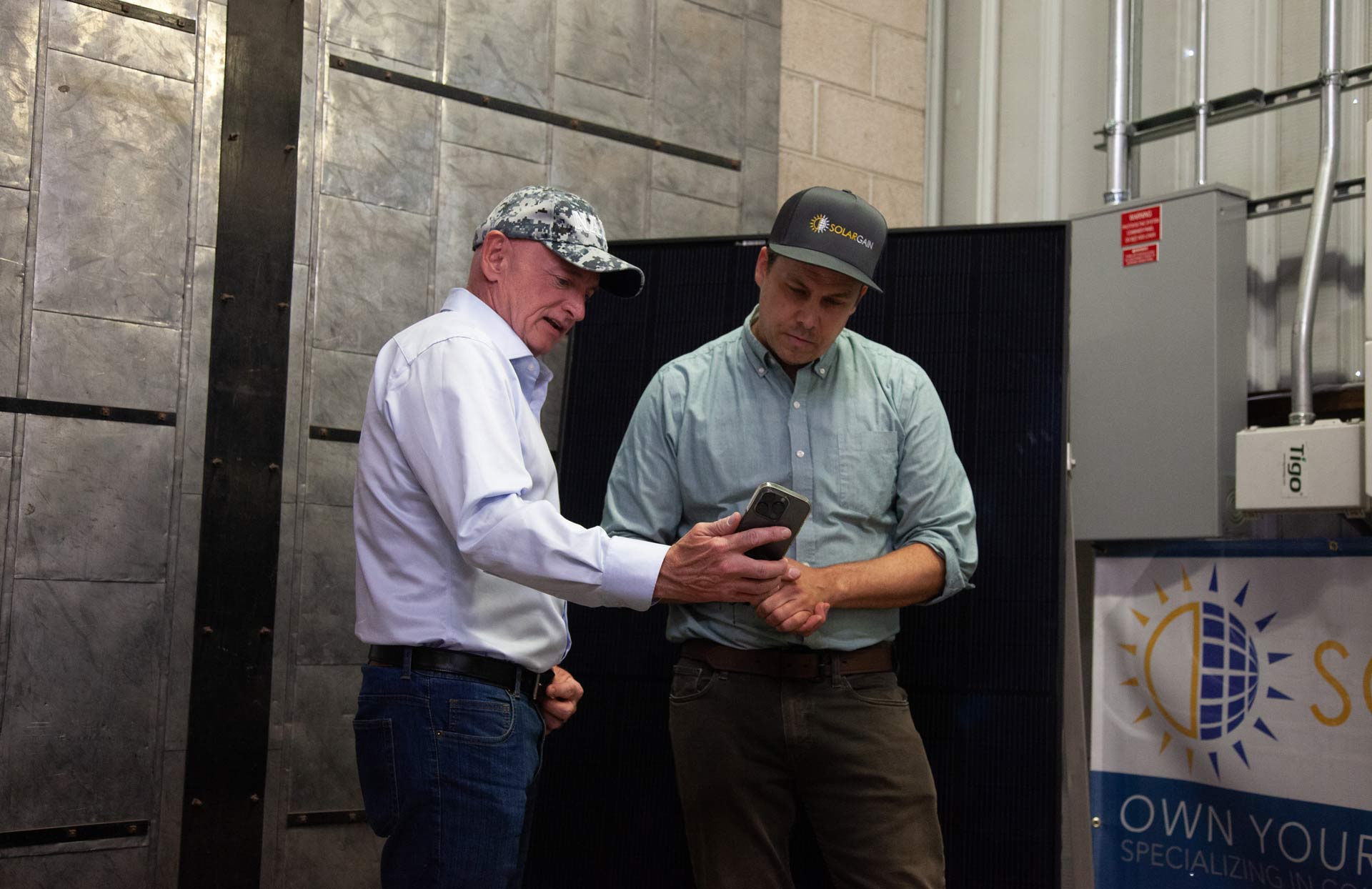 On Friday, May 31, 2024, Senator Mark Kelly gathered with local solar industry leaders at the Solar Gain Inc., facility in Tucson, Ariz., to discuss federal investments into the state for renewable energy. From left to right, Ben Bryce, senior manager of the Environmental Defense Fund Action, Craig Storlie, Tucson solar homeowner, Senator Mark Kelly, Priya Sundareshan, Arizona State Senator, Autumn Johnson, Executive Director of Arizona Solar Energy Industries Association, and Adrian Keller, Arizona program director for Solar United Neighbors of Arizona (SUN).
On Friday, May 31, 2024, Senator Mark Kelly gathered with local solar industry leaders at the Solar Gain Inc., facility in Tucson, Ariz., to discuss federal investments into the state for renewable energy. From left to right, Ben Bryce, senior manager of the Environmental Defense Fund Action, Craig Storlie, Tucson solar homeowner, Senator Mark Kelly, Priya Sundareshan, Arizona State Senator, Autumn Johnson, Executive Director of Arizona Solar Energy Industries Association, and Adrian Keller, Arizona program director for Solar United Neighbors of Arizona (SUN).
Photos and audio by Samantha Callicutt
Arizona is on the frontline for up-and-coming solutions to address climate change thanks to federal investments for renewable energy.
That’s what Senator Mark Kelly (D-AZ) said today at a press conference alongside Arizona State Senator Priya Sundareshan (LD-18) and other local solar industry leaders outside of the local solar manufacturing facility, Solar Gain Inc. in Tucson.
Since 2021, Arizona has received $10.5 billion of investments and incentives into clean energy, through the Bipartisan Infrastructure Law (BIL) and Inflation Reduction Act (IRA).
“We are building and deploying solar panels, batteries and other renewable energy technology that’s going to help reduce emissions and slow climate change,” Kelly said.
Senator Kelly added that these investments have created over 11,000 jobs throughout the state.
Senator Sundareshan added that both the BIL and IRA are the most significant pieces of climate legislation that has come from Congress in recent years, applauding Governor Katie Hobbs’ efforts in addressing climate change.
“Thanks to our Arizona Governor Katie Hobbs, who has stood up the Arizona Office of Resiliency (OOR) to position Arizona to benefit from these federal resources,” Sundareshan said.
The state senator also noted that the OOR will soon distribute about $153 million in home energy rebates for energy efficient purchases for low to medium households and $156 million in Solar for All grants and loans for residential deployment.
Solar for All is a program through the Greenhouse Gas Reduction Fund under the Environmental Protection Agency (EPA) that will allow nearly over 900,000 low-income households to benefit from solar energy.
The state of Arizona was announced as one of 60 recipients of the grant funding in April.
 VIEW LARGER On May 31, 2024, Senator Mark Kelly met with leaders of solar power manufacturer, Solar Gain. Kelly (left) discussed the nuances of Solar Gain's product with their Service and Quality Manager, Andrew Wible (right), and how using solar power will assist Southern Arizona citizens in the future.
VIEW LARGER On May 31, 2024, Senator Mark Kelly met with leaders of solar power manufacturer, Solar Gain. Kelly (left) discussed the nuances of Solar Gain's product with their Service and Quality Manager, Andrew Wible (right), and how using solar power will assist Southern Arizona citizens in the future. Andrew Wible, service and quality manager with Solar Gain said the company has been directly influenced by federal dollars, calling 2022 a market-growth year for the company in terms of labor which increased by 50%.
Still, the clean energy industry has its challenges.
Wible said the biggest challenge to the solar industry is education, as speaking about the environment has its political ties.
“The wrong law, the wrong tariff, the wrong incentive can change everything,” Wible said.
For an average residential solar system in Arizona, it can cost homeowners upwards of $20,000, but Wible believes it's worth it.
“A lot of people do it when you’re forced to look at climate change,” Wible said. “I would just inspire people to understand that money isn’t everything, [consider] the environmental benefit and the emotional benefit that you get from supporting the environment.”
Ben Bryce, senior manager for state affairs at Environmental Defense Fund (EDF) Action, an environmental advocacy nonprofit, said his hope is that people recognize the benefits in investing in clean energy across the state.
“The BIL and IRA, it’s more than just solar, it’s going to have fundamental changes across the economy both today and into the future,” Bryce said.

By submitting your comments, you hereby give AZPM the right to post your comments and potentially use them in any other form of media operated by this institution.